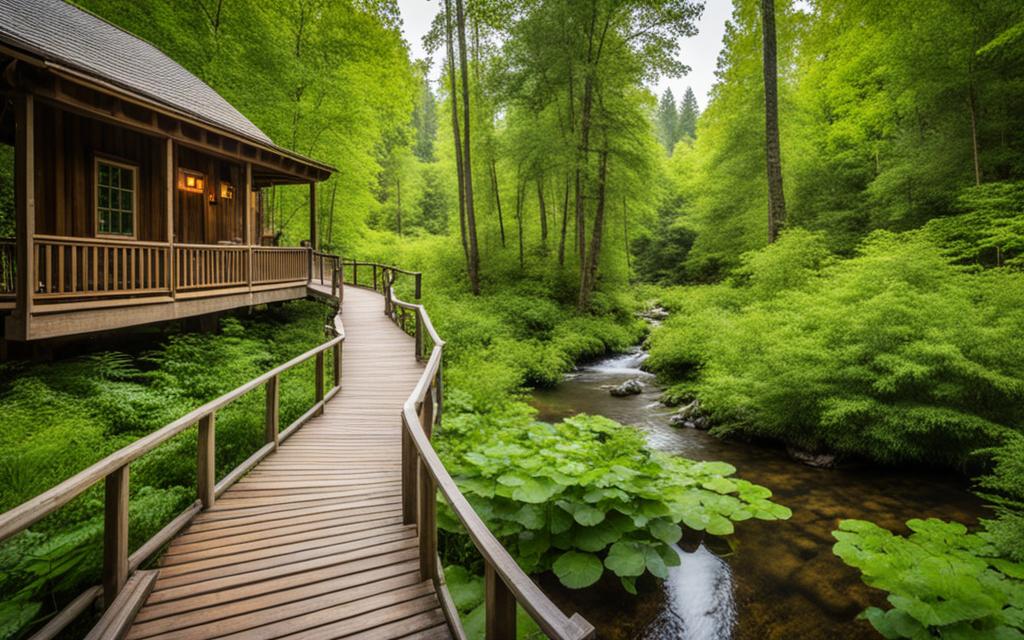At our private nature reserves, we believe in the power of wildlife education to inspire a love for the natural world and promote conservation efforts. Through our commitment to enhancing wildlife education, we aim to provide enriching experiences that connect people with the beauty and importance of nature.
Private nature reserves play a pivotal role in educating individuals about wildlife and the environment. These reserves offer a unique opportunity for people to observe and learn about animals, plants, and ecosystems in their natural habitats. By offering guided tours, educational programs, and hands-on experiences, private nature reserves provide an immersive learning environment that fosters curiosity, appreciation, and understanding.
With a focus on enhancing wildlife education, private nature reserves strive to create meaningful experiences that empower individuals to become stewards of the environment. Through engaging activities and interactive exhibits, visitors can learn about biodiversity, conservation strategies, and the importance of preserving natural habitats. Whether it’s spotting rare bird species, participating in wildlife tracking sessions, or exploring nature trails, there are countless opportunities for visitors to expand their knowledge and develop a deeper connection with the natural world.
By embracing the role of private nature reserves in enhancing wildlife education, we can collectively work towards a future where conservation becomes a way of life. Through shared knowledge and experiences, we can inspire individuals to make sustainable choices and contribute to the preservation of our planet’s biodiversity.
Key Takeaways:
- Private nature reserves play a crucial role in enhancing wildlife education and promoting conservation efforts.
- They provide unique opportunities for people to observe and learn about animals, plants, and ecosystems in their natural habitats.
- Private nature reserves offer guided tours, educational programs, and hands-on experiences to create immersive learning environments.
- By fostering curiosity, appreciation, and understanding, private nature reserves empower individuals to become stewards of the environment.
- Through shared knowledge and experiences, private nature reserves inspire individuals to make sustainable choices and contribute to biodiversity preservation.
The Rise of Private Land Conservation Efforts
In recent years, there has been a significant increase in private land conservation efforts aimed at preserving wildlife and natural ecosystems. The establishment of private nature reserves has played a crucial role in this movement, contributing to the growth of protected areas and the conservation of biodiversity.
Impetus Behind the Growth of Private Nature Reserves
The growth of private nature reserves can be attributed to several key factors. Firstly, many individuals and organizations are driven by a deep passion for wildlife conservation and a desire to protect the natural environment. Private landowners recognize the importance of preserving biodiversity and are willing to invest their resources in establishing and maintaining protected areas on their properties. These individuals understand that private nature reserves can serve as essential habitats for endangered species and contribute to the overall health of ecosystems.
Additionally, the decline in public funding for conservation initiatives has spurred the rise of private land conservation efforts. With limited government resources available for the establishment and maintenance of protected areas, private individuals and organizations have stepped in to fill the gap. Through their financial contributions and dedicated efforts, they have been able to create and manage private nature reserves that serve as vital sanctuaries for wildlife.
Public-Private Partnerships in Wildlife Conservation
Public-private partnerships have emerged as a powerful force in wildlife conservation and the growth of private nature reserves. These partnerships involve collaboration between government entities, non-profit organizations, and private landowners to achieve shared conservation goals. By pooling resources, expertise, and knowledge, public-private partnerships are able to enhance the effectiveness of biodiversity preservation and contribute to the expansion of protected areas.
“The collaboration between public and private entities has allowed for greater success in conserving wildlife and promoting the sustainable use of natural resources,” says Dr. Jane Mitchell, a renowned conservation biologist.
Public-private partnerships provide private nature reserves with access to government grants, scientific expertise, and technical assistance. They also facilitate collaboration between researchers, policymakers, and private landowners, fostering the exchange of ideas and the development of innovative conservation strategies. This collaborative approach ensures that private nature reserves are not operating in isolation but are part of a larger, coordinated effort to protect wildlife and preserve natural habitats.
Role of Private Reserves in Biodiversity Preservation
Private reserves play a vital role in the preservation of biodiversity. These protected areas serve as crucial habitats for a wide range of species, including endangered and threatened wildlife. By providing safe havens for these animals, private reserves contribute significantly to the conservation of biodiversity.
Private nature reserves adopt various conservation strategies and implement initiatives to promote the preservation of biodiversity. These may include habitat restoration, reforestation programs, and the establishment of wildlife corridors. Additionally, private reserves often collaborate with conservation organizations and wildlife experts to develop and implement conservation plans and initiatives.
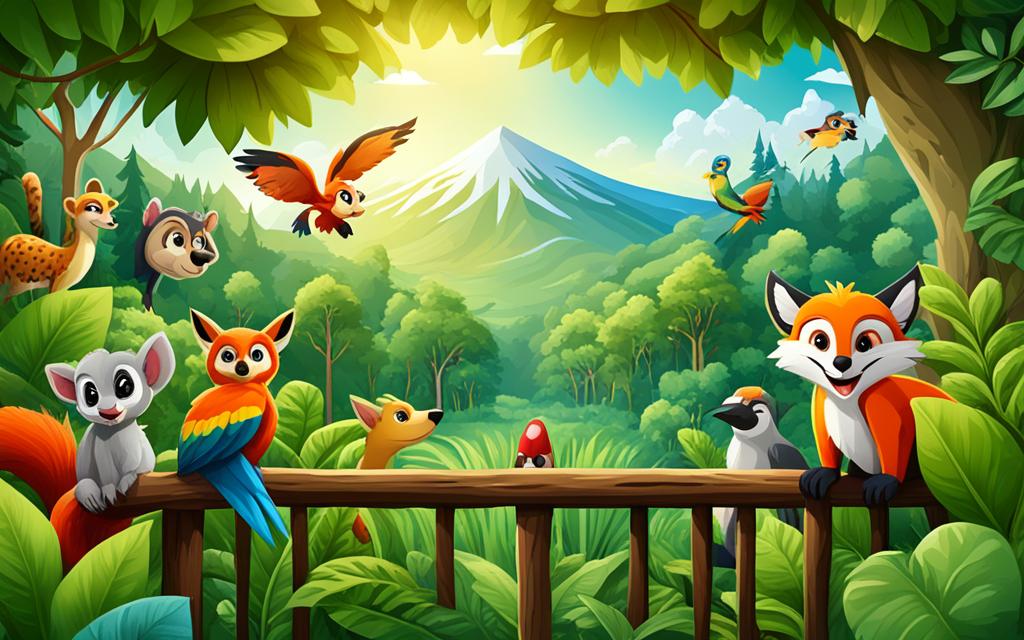
“Private reserves are critical for the long-term survival of many species. They give protected areas for wildlife to flourish, allowing them to play their essential roles in the ecosystems they inhabit.” – Jane Goodall
Private reserves prioritize sustainable land management practices to minimize human impact on the environment and protect fragile ecosystems. This may include responsible tourism practices, limiting visitor numbers, and implementing educational programs to raise awareness about the importance of biodiversity conservation.
Moreover, private reserves often conduct research and monitoring programs to track the health and population trends of various species within their boundaries. This information aids in making informed conservation decisions and understanding the effectiveness of preservation efforts.
The presence of private reserves not only safeguards the biodiversity within their boundaries but also contributes to the overall conservation landscape. By providing protected and well-managed habitats, private reserves help to connect fragmented ecosystems, enabling wildlife to move freely and maintain genetic diversity.
In conclusion, private reserves play a crucial role in the preservation of biodiversity. They provide protected habitats for endangered and threatened wildlife, implement conservation strategies, and contribute to the overall health of ecosystems. Through their efforts, private reserves ensure the long-term survival of diverse species and contribute to the conservation of our planet’s natural heritage.
Outdoor Learning Adventures: Experiential Education in Nature Reserves
At nature reserves, education takes on a whole new dimension as visitors engage in outdoor learning adventures. By providing experiential education, nature reserves offer hands-on learning experiences that foster a deep connection with nature and enhance our understanding of wildlife and ecosystems.
One of the key components of outdoor learning adventures is environmental education activities. Nature reserves organize a variety of activities, such as guided nature walks, wildlife tracking sessions, and interactive workshops, to educate visitors about the natural world. These activities allow participants to actively engage with their surroundings, observe wildlife in their natural habitats, and develop a deeper appreciation for the environment.
“Outdoor learning adventures provide a unique opportunity for individuals to immerse themselves in nature and gain firsthand experiences that cannot be replicated in a classroom setting.” – Jane Anderson, Environmental Educator
By participating in these activities, individuals gain practical knowledge and skills that contribute to their overall environmental literacy. Experiential education not only offers a more effective learning experience but also instills a sense of wonder and curiosity about the natural world, inspiring participants to become stewards of the environment.
To visually illustrate the range of hands-on learning experiences available in nature reserves, here’s an image showcasing a group of students participating in a guided nature walk:
These outdoor learning adventures not only benefit students but also individuals of all ages. They offer an escape from the hustle and bustle of daily life and provide an opportunity for everyone to connect with nature, learn about local ecosystems, and gain a better understanding of the importance of conservation.
With nature reserves serving as valuable educational platforms, experiential education plays a vital role in inspiring environmental stewardship and creating a generation of individuals who are passionate about the natural world. It’s through these hands-on learning experiences that we can truly appreciate the wonders of nature and work towards a sustainable future.
Struggles and Triumphs: Challenges Faced by Private Nature Reserves
Private nature reserves play a crucial role in enhancing wildlife education, but they face various challenges in fulfilling their mission. These challenges include limited funding, land management issues, and conflicts with neighboring communities. However, despite these obstacles, private nature reserves have also achieved remarkable triumphs in wildlife conservation and education.
One of the major challenges faced by private nature reserves is limited funding. As these reserves rely heavily on donations and grants, securing financial resources becomes a constant struggle. This financial constraint can hinder the implementation of educational programs and the conservation efforts needed to protect wildlife habitats.
Additionally, private nature reserves often encounter land management issues. Balancing the needs of wildlife conservation and sustainable land use poses significant challenges. Reserves must establish effective strategies to maintain and restore habitats while considering the economic viability of the land.
Conflicts with neighboring communities also present challenges for private nature reserves. Local communities may have competing interests, such as agricultural expansion or resource extraction, which may impact the integrity of the reserve and create tensions. Balancing the needs of these communities with the conservation goals of the reserve requires careful negotiation and community engagement.
Despite these challenges, private nature reserves have achieved remarkable triumphs in wildlife conservation and education. Through innovative approaches and collaborative efforts, these reserves have successfully protected endangered species, restored ecosystems, and educated the public about the importance of biodiversity.
Private nature reserves have also made significant contributions to scientific research and wildlife monitoring, generating valuable data that informs conservation strategies on a broader scale. These reserves serve as living laboratories that provide researchers with unique opportunities to study and understand the intricate connections between wildlife and their habitats.
Furthermore, private nature reserves have played a vital role in raising awareness about wildlife conservation and inspiring individuals to become actively involved in protecting the environment. By providing educational programs, volunteer opportunities, and immersive experiences, these reserves empower people to develop a deep appreciation for nature and take action to preserve it.
In conclusion, private nature reserves face formidable challenges to enhance wildlife education. However, their triumphs in wildlife conservation and education demonstrate their unwavering commitment to preserving biodiversity and inspiring future generations. Through overcoming obstacles, private nature reserves continue to make a significant impact on wildlife conservation and play a critical role in fostering a society that values and protects our natural world.
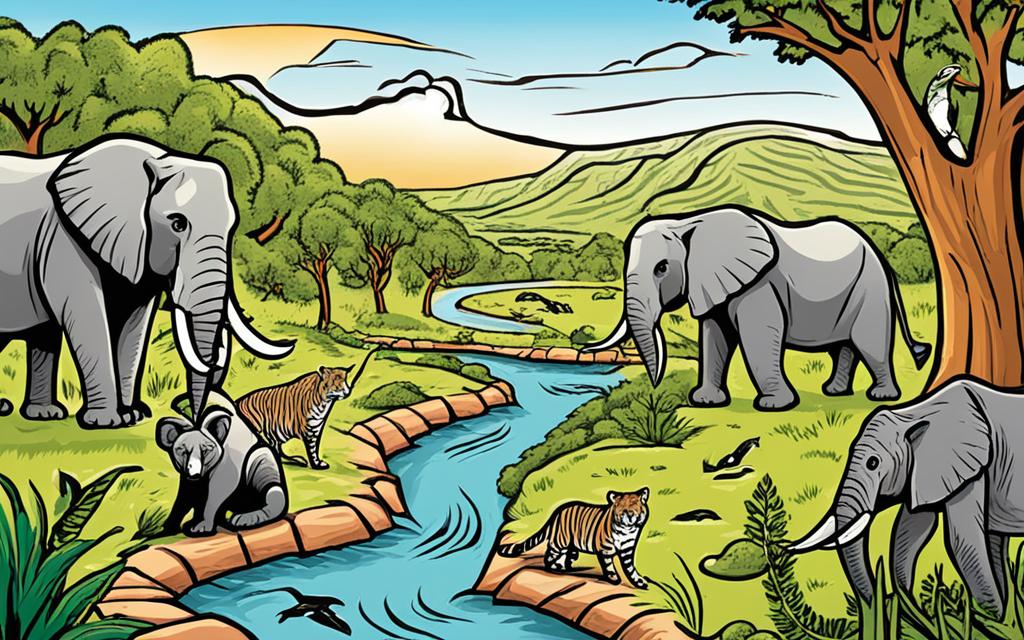
Innovative Environmental Education Programs on Private Lands
Private nature reserves play a crucial role in the advancement of environmental education programs. These programs, implemented on private lands, provide unique opportunities for students to engage with nature and develop a deep understanding of the environment. Through nature-based curriculums and strategic partnerships, private nature reserves are fostering student engagement and promoting environmental stewardship.
Nature-Based Curriculums and Student Engagement
Nature-based curriculums are at the forefront of innovative environmental education programs on private lands. These curriculums integrate classroom learning with hands-on experiences in nature reserves, allowing students to develop a holistic understanding of the environment. By incorporating outdoor activities, such as guided hikes, wildlife observation, and habitat restoration projects, nature-based curriculums promote student engagement and facilitate a deeper connection with the natural world.
“Through nature-based curriculums, students develop a sense of environmental responsibility and become active participants in conservation efforts.”
Furthermore, nature-based curriculums align with the principles of experiential learning, providing students with practical knowledge and skills through direct interaction with the environment. This approach not only enhances students’ understanding of environmental concepts but also instills a sense of environmental stewardship and encourages lifelong learning.
Partnerships with Schools and Conservationists for Education
Partnerships between private nature reserves, schools, and conservationists play a vital role in promoting environmental education and enhancing wildlife conservation. By collaborating with schools, private nature reserves can provide students with unique learning opportunities centered around hands-on experiences in natural settings. These partnerships enable schools to incorporate environmental education into their curriculum and empower students to become active agents in environmental conservation.
Collaborations with conservationists further enhance the educational impact of private nature reserves. Conservationists bring their expertise and knowledge to the table, offering valuable insights and guidance in environmental education programs. Their involvement helps students understand the importance of conservation efforts and exposes them to real-world conservation challenges.
Table: Environmental Education Programs on Private Lands
| Program | Description |
|---|---|
| Nature-based Curriculums | Integrating outdoor activities and direct interactions with the environment to enhance student engagement and understanding |
| Student Conservation Internships | Providing students with practical experience in conservation projects under the guidance of professionals |
| Teacher Workshops | Equipping educators with the knowledge and tools to incorporate environmental education into their teaching |
| Conservation Camps | Offering immersive experiences for students to learn about wildlife, ecosystems, and conservation practices |
| Environmental Research Programs | Engaging students in scientific research projects to deepen their understanding of environmental issues |
Environmental education programs on private lands provide a rich and diverse array of opportunities for students to learn about and connect with the natural world. Through nature-based curriculums and partnerships with schools and conservationists, private nature reserves are nurturing the next generation of environmental stewards and fostering a greater appreciation for the importance of wildlife conservation.
Community Benefits and Social Well-being Through Nature Engagement
Engaging with nature through private nature reserves offers a multitude of community benefits and contributes to social well-being. These reserves provide an ideal setting for environmental education, fostering a deep connection to the natural world and promoting a sense of stewardship among individuals.
One of the key community benefits of nature engagement is the opportunity for people to improve their physical and mental health. Spending time in nature has been shown to reduce stress levels, lower blood pressure, and boost overall well-being. By providing access to green spaces and educational programs, private nature reserves play a crucial role in promoting healthier and happier communities.
Additionally, nature engagement through private nature reserves enhances community connections. These reserves often organize events, workshops, and guided walks that bring people together to learn and appreciate the environment. This fosters a sense of belonging and camaraderie among community members, strengthening social ties and creating a shared appreciation for nature.
Environmental education is a vital component of nature engagement through private nature reserves. By offering hands-on learning experiences, educational programs in these reserves increase awareness and understanding of environmental issues. This knowledge empowers individuals to make informed decisions and take action to protect the environment. Moreover, these programs inspire a new generation of environmental stewards who are passionate about conservation and sustainability.
Engaging with nature through private nature reserves not only benefits individuals but also contributes to the overall well-being and social fabric of communities.
Private nature reserves serve as living classrooms, connecting people with the natural world and inspiring a love for nature. By providing opportunities for environmental education, these reserves contribute to the creation of a more environmentally conscious society. They play an instrumental role in cultivating a sense of responsibility towards the planet and ensuring the conservation of our precious natural resources for future generations.
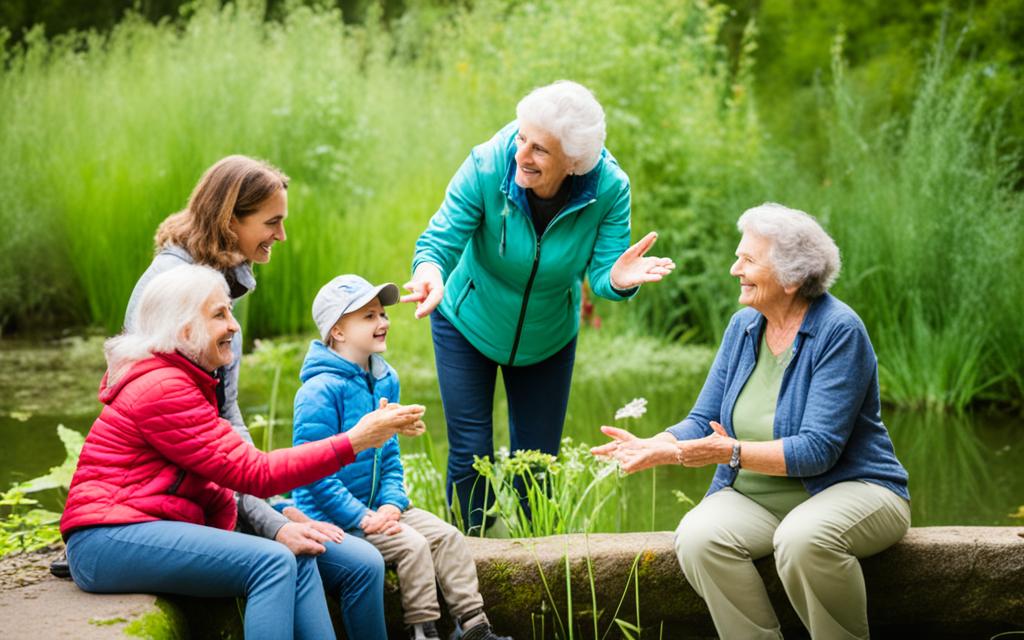
Wildlife Education Through Recreational Activities
At private nature reserves, wildlife education goes beyond traditional classroom settings. By integrating recreational activities, these reserves offer unique and engaging experiences that enhance learning and foster a deeper connection with nature.
Adventure Education: Merging Recreation With Learning
Adventure education is a central component of wildlife education in private nature reserves. It combines recreational activities with educational objectives, immersing participants in hands-on learning experiences. These activities not only provide opportunities for physical exercise and exploration but also enable individuals to gain knowledge about wildlife and ecosystems.
“Adventure education allows us to merge recreation with learning, creating an immersive and impactful experience. It’s about stepping out of our comfort zones and embarking on journeys that nurture our understanding of the natural world.” – John Hendricks, Nature Educator
Through adventure education, participants can engage in activities such as guided hikes, nature walks, and canoe trips. These experiences enable them to discover wildlife habitats, observe native species up close, and learn about their behaviors and conservation needs. By merging recreation with learning, adventure education offers a dynamic and memorable way to explore the natural world.
Hands-On Learning Experiences: From Bird-Watching to Wilderness Skills
Hands-on learning experiences play a crucial role in wildlife education at private nature reserves. From bird-watching to wilderness skills training, these activities provide individuals with firsthand encounters and practical knowledge of the natural environment.
Bird-watching, for example, offers an immersive experience where participants can observe various bird species in their natural habitats. Guided by knowledgeable experts, they learn about different bird calls, behaviors, and conservation efforts. This hands-on approach deepens their understanding of avian ecology and fosters a sense of appreciation for bird diversity.
Wilderness skills training is another essential component of wildlife education. It equips individuals with the knowledge and abilities to survive and thrive in the wilderness. Participants learn essential skills such as shelter-building, fire-making, and navigation, enhancing their understanding of ecosystems and their connection with the natural world.
These hands-on learning experiences not only contribute to wildlife education but also instill a sense of environmental stewardship. By actively engaging with nature, individuals develop a strong desire to protect and conserve wildlife and their habitats.
Case Studies: Success Stories of Enhanced Wildlife Education
In this section, we present compelling case studies that highlight the success stories of private nature reserves in enhancing wildlife education. These case studies showcase how these reserves have implemented innovative educational programs, collaborated with local communities, and made a significant impact on wildlife conservation and education.
“Our private nature reserve, WildScapes, has been instrumental in enhancing wildlife education in our community. Through our immersive educational programs, we have successfully engaged students and visitors in hands-on learning experiences, fostering a deeper connection with nature and a better understanding of wildlife.”
– Jane Anderson, Manager of WildScapes Nature Reserve
One notable case study is the Simba Valley Preserve, located in the heart of the Serengeti. This private nature reserve has implemented a comprehensive wildlife education curriculum for local schools, incorporating both classroom learning and field trips within the reserve. Through interactive workshops, guided nature walks, and wildlife tracking activities, students have gained valuable knowledge about biodiversity conservation, habitat preservation, and ecological sustainability.
The Simba Valley Preserve has also developed partnerships with conservation organizations and researchers, providing students with unique opportunities to participate in ongoing research projects. This hands-on involvement has not only deepened their understanding of wildlife but has also inspired them to become future conservationists and advocates.
Another success story is the Great Barrier Reef Marine Park, a private reserve dedicated to preserving the rich marine ecosystem of the Great Barrier Reef. Through their educational programs, visitors have the opportunity to learn about the delicate balance of the reef ecosystem and the importance of sustainable practices in protecting this natural wonder.
The reserve offers guided snorkeling tours, underwater photography workshops, and interactive presentations by marine biologists. These immersive experiences allow visitors to witness the breathtaking beauty of the reef while gaining a deeper understanding of its significance and the actions needed to preserve it for future generations.
By sharing these case studies, we aim to inspire and encourage the creation of more private nature reserves focused on enhancing wildlife education. These success stories demonstrate the positive impact that private nature reserves can have on promoting environmental awareness, fostering a love for nature, and ensuring the long-term conservation of our precious wildlife.
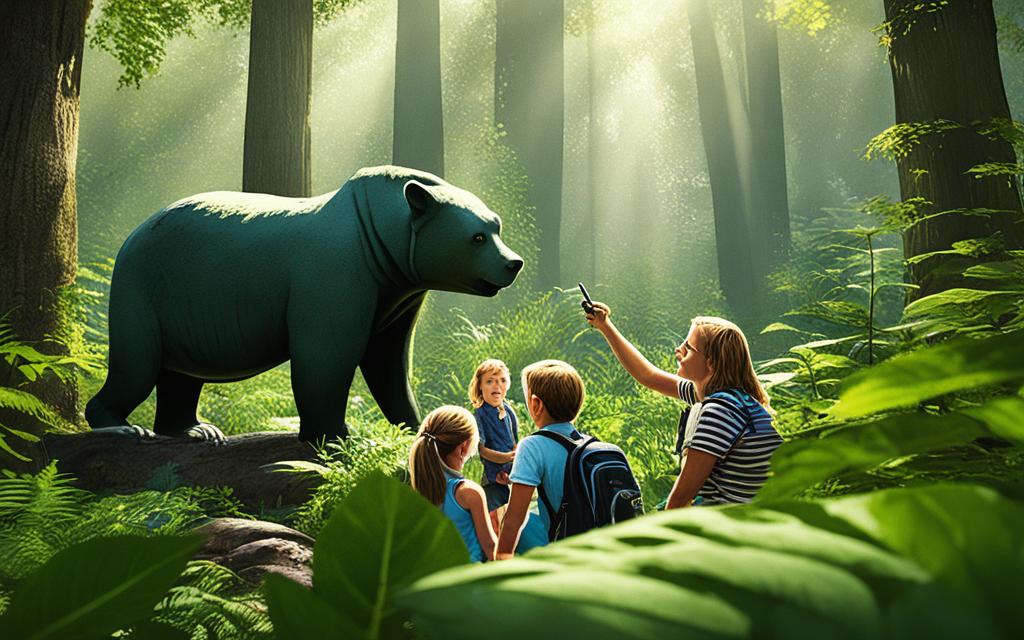
| Private Nature Reserve | Location | Key Initiatives |
|---|---|---|
| WildScapes | California, USA | Immersive educational programs, hands-on learning experiences, community engagement |
| Simba Valley Preserve | Serengeti, Tanzania | Comprehensive wildlife education curriculum, partnerships with schools and researchers |
| Great Barrier Reef Marine Park | Queensland, Australia | Guided snorkeling tours, underwater photography workshops, marine biologist presentations |
Economic Impact of Educational Nature Reserves on Local Communities
Educational nature reserves not only play a crucial role in wildlife conservation and education but also have a significant economic impact on local communities. By offering wildlife education programs and promoting ecotourism, these reserves contribute to job creation, economic growth, and the financial sustainability of the surrounding areas.
Ecotourism and Job Creation Through Educational Programs
One of the key economic benefits of educational nature reserves is the promotion of ecotourism. Visitors who come to these reserves for wildlife education purposes often engage in various recreational activities, such as nature walks, bird-watching, and guided tours. This influx of tourists creates a demand for accommodations, local goods and services, and outdoor recreational activities, which leads to the creation of new job opportunities within the community.
“Wildlife education programs in nature reserves not only provide knowledge and awareness but also stimulate the local economy by attracting tourists and creating employment opportunities.” – John Peterson, CEO of Nature’s Haven Reserve.
Through educational programs, nature reserves enhance the attractiveness of the destination and generate revenue for the local economy. Visitors who participate in guided tours or workshops often spend money on accommodations, meals, transportation, and souvenirs, thereby benefiting local businesses and stimulating economic growth. This increased tourism expenditure helps to support the livelihoods of residents, create jobs in the hospitality and tourism sectors, and contribute to the overall development of the community.
Financial Sustainability of Private Nature Reserves
Private nature reserves rely on a variety of revenue streams to support their ongoing operation and conservation efforts. Educational programs contribute significantly to the financial sustainability of these reserves. Fees paid by visitors for guided tours, workshops, and educational activities provide funding for habitat conservation, wildlife research, and the overall management of the reserve.
In addition to direct revenue generated through wildlife education programs, private nature reserves often receive support from grants, donations, and partnerships with conservation organizations. These financial resources allow them to invest in infrastructure development, habitat restoration projects, and the employment of dedicated staff members, further benefitting the local economy through job creation.
Furthermore, private nature reserves often collaborate with local communities to develop sustainable initiatives that generate income and support conservation efforts. For example, communities may participate in the production and sale of locally made crafts or agricultural products, creating economic opportunities that are deeply tied to the surrounding natural environment.
Overall, the economic impact of educational nature reserves on local communities is substantial. By promoting ecotourism, creating job opportunities, and fostering financial sustainability, these reserves contribute to the well-being and development of the communities surrounding them.
Conclusion
In conclusion, private nature reserves play a vital role in enhancing wildlife education. These reserves provide unique opportunities for people to learn about the natural world and develop a deeper appreciation for wildlife and ecosystems. Through their conservation efforts, private nature reserves contribute to the preservation of biodiversity and the protection of endangered species. The partnerships between private reserves and schools, conservationists, and local communities are essential in promoting environmental education and fostering a sense of stewardship.
By offering experiential learning experiences and nature-based curriculums, private nature reserves engage students and visitors in impactful educational programs. These programs not only provide knowledge about wildlife but also instill a sense of wonder and connection with the natural world. The economic impact of educational nature reserves extends beyond conservation, as ecotourism activities and job creation associated with these reserves benefit local communities.
Supporting private nature reserves is crucial in ensuring the continued success of wildlife education and conservation efforts. Whether through financial contributions, volunteer work, or simply spreading awareness, we can all contribute to the important work of these reserves. By working together, we can foster a deeper understanding and appreciation for wildlife, protect our natural heritage, and inspire future generations to become stewards of the earth.
